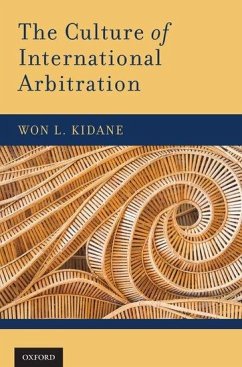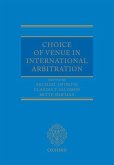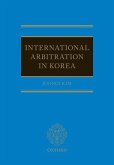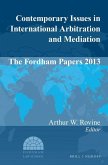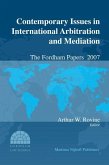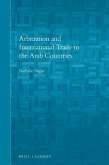Kidane
The Culture of International Arbitration
Kidane
The Culture of International Arbitration
- Gebundenes Buch
- Merkliste
- Auf die Merkliste
- Bewerten Bewerten
- Teilen
- Produkt teilen
- Produkterinnerung
- Produkterinnerung
This book offers an in-depth study of the role of culture in modern day arbitral proceedings. It contains a detailed analysis of how cultural miscommunication affects the accuracy, efficiency, fairness, and legitimacy in both commercial and investment arbitration when the arbitrators and the parties, their counsel and witnesses come from diverse legal traditions and cultures. The book provides a comprehensive definition of culture, and methodically documents and examines the epistemology of determining facts in various legal traditions and how the mixing of traditions influences the outcome.
Andere Kunden interessierten sich auch für
![The Evolution of International Arbitration The Evolution of International Arbitration]() Alec Stone SweetThe Evolution of International Arbitration180,99 €
Alec Stone SweetThe Evolution of International Arbitration180,99 €![Choice of Venue in International Arbitration Choice of Venue in International Arbitration]() Bette ShifmanChoice of Venue in International Arbitration394,99 €
Bette ShifmanChoice of Venue in International Arbitration394,99 €![Attribution in International Law and Arbitration Attribution in International Law and Arbitration]() Carlo de StefanoAttribution in International Law and Arbitration161,99 €
Carlo de StefanoAttribution in International Law and Arbitration161,99 €![International Arbitration in Korea International Arbitration in Korea]() Joongi KimInternational Arbitration in Korea341,99 €
Joongi KimInternational Arbitration in Korea341,99 €![Contemporary Issues in International Arbitration and Mediation: The Fordham Papers (2013) Contemporary Issues in International Arbitration and Mediation: The Fordham Papers (2013)]() Contemporary Issues in International Arbitration and Mediation: The Fordham Papers (2013)297,99 €
Contemporary Issues in International Arbitration and Mediation: The Fordham Papers (2013)297,99 €![Contemporary Issues in International Arbitration and Mediation: The Fordham Papers (2008) Contemporary Issues in International Arbitration and Mediation: The Fordham Papers (2008)]() Contemporary Issues in International Arbitration and Mediation: The Fordham Papers (2008)283,99 €
Contemporary Issues in International Arbitration and Mediation: The Fordham Papers (2008)283,99 €![Arbitration and International Trade in the Arab Countries Arbitration and International Trade in the Arab Countries]() Nathalie NajjarArbitration and International Trade in the Arab Countries537,99 €
Nathalie NajjarArbitration and International Trade in the Arab Countries537,99 €-
-
-
This book offers an in-depth study of the role of culture in modern day arbitral proceedings. It contains a detailed analysis of how cultural miscommunication affects the accuracy, efficiency, fairness, and legitimacy in both commercial and investment arbitration when the arbitrators and the parties, their counsel and witnesses come from diverse legal traditions and cultures. The book provides a comprehensive definition of culture, and methodically documents and examines the epistemology of determining facts in various legal traditions and how the mixing of traditions influences the outcome.
Hinweis: Dieser Artikel kann nur an eine deutsche Lieferadresse ausgeliefert werden.
Hinweis: Dieser Artikel kann nur an eine deutsche Lieferadresse ausgeliefert werden.
Produktdetails
- Produktdetails
- Verlag: Oxford University Press
- Seitenzahl: 336
- Erscheinungstermin: 24. März 2017
- Englisch
- Abmessung: 236mm x 155mm x 25mm
- Gewicht: 635g
- ISBN-13: 9780199973927
- ISBN-10: 019997392X
- Artikelnr.: 47871047
- Herstellerkennzeichnung
- Libri GmbH
- Europaallee 1
- 36244 Bad Hersfeld
- gpsr@libri.de
- Verlag: Oxford University Press
- Seitenzahl: 336
- Erscheinungstermin: 24. März 2017
- Englisch
- Abmessung: 236mm x 155mm x 25mm
- Gewicht: 635g
- ISBN-13: 9780199973927
- ISBN-10: 019997392X
- Artikelnr.: 47871047
- Herstellerkennzeichnung
- Libri GmbH
- Europaallee 1
- 36244 Bad Hersfeld
- gpsr@libri.de
Won L. Kidane is a Fulbright Scholar and a tenured Associate Professor of Law at the Seattle University School of Law, where he teaches international arbitration and litigation among other courses. He is the author of China-Africa Dispute Settlement (2011) and co-author of Litigating War: Mass Civil Injury and the Eritrea-Ethiopia Claims Commission (With Sean D. Murphy and Thomas R. Snider, OUP 2014). He has written dozens of articles published in law reviews and leading international law journals including Cornell, University of Pennsylvania, Vanderbilt, Emory, Fordham, and Wisconsin. Before becoming a professor at Seattle University Law School, he practiced as an arbitration attorney at DLA Piper and at Hunton & Williams, LLP in Washington, D.C. He is currently a partner at the Addis Law Group, LLP, a Washington D.C. based boutique international arbitration firm.
* Preface
* Acknowledgments
* Table Of Select Abbreviations
* Table Of Cases
* Table Of Statutes
* Table Of Conventions
* Part One
* Culture And The Legal Framework And Theoretical Pillars Of
International Arbitation
* Chapter 1: Introduction
* Chapter 2: Defining Legal Culture
* A. A Brief Look At Culture In Transnational Business
* B. Preliminary Thoughts On Culture In International Arbitration
* C. Conclusion
* Chapter 3: The Political And Cultural History Of International
Arbitration In Various Legal Traditions
* A. The Political And Cultural History Of Contemporary International
Arbitration
* B. The Evolution Of The Courts' Tolerance Of International
Arbitration In Various Legal Traditions
* 1. Common Law Legal Tradition
* 2. Civil Law Legal Tradition
* 3. Chinese Legal Tradition
* 4. African Legal Tradition
* Chapter 4: The Theories And Theoreticians Of International
Arbitration
* A. The Theories And Theoreticians
* 1. Emmanuel Gaillard's Theory
* 2. Jan Paulsson's Theory
* 3. Catherine Rogers' Theory
* 4. Gary Born's Theory
* 5. Sundaresh Menon's Theory
* 6. David Caron's Theory
* B. Conclusion
* Chapter 5: The Evolving Justifications Of International Arbitration
* A. Initial Justifications
* B. Contemporary Justifications
* C. Assessing The Credibility Of The Contemporary Justifications
* 1. Jurisdictional Justification
* 2. Promotional Justifications
* D. Conclusion
* Chapter 6: Culture And The Legal Infrastructure Of Commercial
Arbitration
* A. A Cultural Analysis Of The Legal Framework
* 1. The New York Convention
* B. Conclusion
* Chapter 7: Culture And The Legal Infrastructure Of Investment
Arbitration
* A. The Icsid Legitimacy Debate
* 1. Empirical Studies
* 2. A Closer Look At The Empirical Studies
* B. A Historical Perspective
* 1. The Doctrinal Debate
* 2. Why Was Icsid Accepted?
* C. Quantitative Indicators
* 1. Arbitrator Nationality
* 2. Counsel Nationality
* 3. Claimant Nationality
* 4. Location
* 5. Outcome On Jurisdiction
* 6. Outcome On The Merits
* 7. Allocation Of Cost
* D. The Virtues Of Aristocratic Justice
* 1. Who Are The "Virtuous" Men?
* 2. Why Do The Africans Appoint The Virtuous Men?
* E. Conclusion
* Part Two
* Deconstructing The Mythology Of Specialized Knowledge In
International Arbitration
* Chapter 8: Diversity In The Epistomology Of Judicial Fact Finding In
The Major Legal Traditions Of The World: Indicators For Conduct In
International Arbitration
* A. Fact Finding In The Common Law Legal Tradition
* B. Fact Finding In The Civil Law Legal Tradition
* C. Fact Finding In The Chinese Legal Tradition
* D. Fact Finding In Islamic Legal Tradition
* E. Conclusion
* Chapter 9: Fact Finding And Cultural Diversity In International
Arbitration
* A. Fact-Finding In The Fog
* B. Culture As Fact; Fact As Culture
* C. Interpretation And Application Of Law As A Cultural Practice
* Chapter 10: The Typical Process For Selection And Challenge Of
Arbitrators
* A. Appointment And Challenge
* 1. Appointment
* 2. Challenge
* 3. The Conduct Of Arbitration
* 4. The Iba Rules On The Taking Of Evidence In International
Arbitration
* B. Conclusion
* Chapter 11: The Mythology Of Specialized Knowledge
* A. Jan Paulsson's Question: "Who's Complaining?"
* 1. The Audacity Of Elitism
* 2. Culturally Different Facts And Concepts: Applied Legal Philosophy
* B. Conclusion
* Chapter 12: Conversations On The Role Of Culture In International
Arbitration
* 1. Introduction
* 2. Conversations File
* A. Conversation With Judge Abdulqawi Yusuf, Vice President Of The
International Court Of Justice.
* B. Conversation With Judge Judge Xue Hanqin, Judge Of The
International Court Of Justice.
* C. Conversation With Judge Julia Sebutinde, Judge Of The
International Court Of Justice.
* D. Conversation With Jurist No. 1
* E. Conversation With Jurist No. 2
* F. Conversation With Jurist No. 3
* G. Conversation With Jurist No. 4
* H. Conversation With Mr. Thomas R. Snider
* Chapter 13: Summary Of Conclusions
* Bibliography
* Index
* Acknowledgments
* Table Of Select Abbreviations
* Table Of Cases
* Table Of Statutes
* Table Of Conventions
* Part One
* Culture And The Legal Framework And Theoretical Pillars Of
International Arbitation
* Chapter 1: Introduction
* Chapter 2: Defining Legal Culture
* A. A Brief Look At Culture In Transnational Business
* B. Preliminary Thoughts On Culture In International Arbitration
* C. Conclusion
* Chapter 3: The Political And Cultural History Of International
Arbitration In Various Legal Traditions
* A. The Political And Cultural History Of Contemporary International
Arbitration
* B. The Evolution Of The Courts' Tolerance Of International
Arbitration In Various Legal Traditions
* 1. Common Law Legal Tradition
* 2. Civil Law Legal Tradition
* 3. Chinese Legal Tradition
* 4. African Legal Tradition
* Chapter 4: The Theories And Theoreticians Of International
Arbitration
* A. The Theories And Theoreticians
* 1. Emmanuel Gaillard's Theory
* 2. Jan Paulsson's Theory
* 3. Catherine Rogers' Theory
* 4. Gary Born's Theory
* 5. Sundaresh Menon's Theory
* 6. David Caron's Theory
* B. Conclusion
* Chapter 5: The Evolving Justifications Of International Arbitration
* A. Initial Justifications
* B. Contemporary Justifications
* C. Assessing The Credibility Of The Contemporary Justifications
* 1. Jurisdictional Justification
* 2. Promotional Justifications
* D. Conclusion
* Chapter 6: Culture And The Legal Infrastructure Of Commercial
Arbitration
* A. A Cultural Analysis Of The Legal Framework
* 1. The New York Convention
* B. Conclusion
* Chapter 7: Culture And The Legal Infrastructure Of Investment
Arbitration
* A. The Icsid Legitimacy Debate
* 1. Empirical Studies
* 2. A Closer Look At The Empirical Studies
* B. A Historical Perspective
* 1. The Doctrinal Debate
* 2. Why Was Icsid Accepted?
* C. Quantitative Indicators
* 1. Arbitrator Nationality
* 2. Counsel Nationality
* 3. Claimant Nationality
* 4. Location
* 5. Outcome On Jurisdiction
* 6. Outcome On The Merits
* 7. Allocation Of Cost
* D. The Virtues Of Aristocratic Justice
* 1. Who Are The "Virtuous" Men?
* 2. Why Do The Africans Appoint The Virtuous Men?
* E. Conclusion
* Part Two
* Deconstructing The Mythology Of Specialized Knowledge In
International Arbitration
* Chapter 8: Diversity In The Epistomology Of Judicial Fact Finding In
The Major Legal Traditions Of The World: Indicators For Conduct In
International Arbitration
* A. Fact Finding In The Common Law Legal Tradition
* B. Fact Finding In The Civil Law Legal Tradition
* C. Fact Finding In The Chinese Legal Tradition
* D. Fact Finding In Islamic Legal Tradition
* E. Conclusion
* Chapter 9: Fact Finding And Cultural Diversity In International
Arbitration
* A. Fact-Finding In The Fog
* B. Culture As Fact; Fact As Culture
* C. Interpretation And Application Of Law As A Cultural Practice
* Chapter 10: The Typical Process For Selection And Challenge Of
Arbitrators
* A. Appointment And Challenge
* 1. Appointment
* 2. Challenge
* 3. The Conduct Of Arbitration
* 4. The Iba Rules On The Taking Of Evidence In International
Arbitration
* B. Conclusion
* Chapter 11: The Mythology Of Specialized Knowledge
* A. Jan Paulsson's Question: "Who's Complaining?"
* 1. The Audacity Of Elitism
* 2. Culturally Different Facts And Concepts: Applied Legal Philosophy
* B. Conclusion
* Chapter 12: Conversations On The Role Of Culture In International
Arbitration
* 1. Introduction
* 2. Conversations File
* A. Conversation With Judge Abdulqawi Yusuf, Vice President Of The
International Court Of Justice.
* B. Conversation With Judge Judge Xue Hanqin, Judge Of The
International Court Of Justice.
* C. Conversation With Judge Julia Sebutinde, Judge Of The
International Court Of Justice.
* D. Conversation With Jurist No. 1
* E. Conversation With Jurist No. 2
* F. Conversation With Jurist No. 3
* G. Conversation With Jurist No. 4
* H. Conversation With Mr. Thomas R. Snider
* Chapter 13: Summary Of Conclusions
* Bibliography
* Index
* Preface
* Acknowledgments
* Table Of Select Abbreviations
* Table Of Cases
* Table Of Statutes
* Table Of Conventions
* Part One
* Culture And The Legal Framework And Theoretical Pillars Of
International Arbitation
* Chapter 1: Introduction
* Chapter 2: Defining Legal Culture
* A. A Brief Look At Culture In Transnational Business
* B. Preliminary Thoughts On Culture In International Arbitration
* C. Conclusion
* Chapter 3: The Political And Cultural History Of International
Arbitration In Various Legal Traditions
* A. The Political And Cultural History Of Contemporary International
Arbitration
* B. The Evolution Of The Courts' Tolerance Of International
Arbitration In Various Legal Traditions
* 1. Common Law Legal Tradition
* 2. Civil Law Legal Tradition
* 3. Chinese Legal Tradition
* 4. African Legal Tradition
* Chapter 4: The Theories And Theoreticians Of International
Arbitration
* A. The Theories And Theoreticians
* 1. Emmanuel Gaillard's Theory
* 2. Jan Paulsson's Theory
* 3. Catherine Rogers' Theory
* 4. Gary Born's Theory
* 5. Sundaresh Menon's Theory
* 6. David Caron's Theory
* B. Conclusion
* Chapter 5: The Evolving Justifications Of International Arbitration
* A. Initial Justifications
* B. Contemporary Justifications
* C. Assessing The Credibility Of The Contemporary Justifications
* 1. Jurisdictional Justification
* 2. Promotional Justifications
* D. Conclusion
* Chapter 6: Culture And The Legal Infrastructure Of Commercial
Arbitration
* A. A Cultural Analysis Of The Legal Framework
* 1. The New York Convention
* B. Conclusion
* Chapter 7: Culture And The Legal Infrastructure Of Investment
Arbitration
* A. The Icsid Legitimacy Debate
* 1. Empirical Studies
* 2. A Closer Look At The Empirical Studies
* B. A Historical Perspective
* 1. The Doctrinal Debate
* 2. Why Was Icsid Accepted?
* C. Quantitative Indicators
* 1. Arbitrator Nationality
* 2. Counsel Nationality
* 3. Claimant Nationality
* 4. Location
* 5. Outcome On Jurisdiction
* 6. Outcome On The Merits
* 7. Allocation Of Cost
* D. The Virtues Of Aristocratic Justice
* 1. Who Are The "Virtuous" Men?
* 2. Why Do The Africans Appoint The Virtuous Men?
* E. Conclusion
* Part Two
* Deconstructing The Mythology Of Specialized Knowledge In
International Arbitration
* Chapter 8: Diversity In The Epistomology Of Judicial Fact Finding In
The Major Legal Traditions Of The World: Indicators For Conduct In
International Arbitration
* A. Fact Finding In The Common Law Legal Tradition
* B. Fact Finding In The Civil Law Legal Tradition
* C. Fact Finding In The Chinese Legal Tradition
* D. Fact Finding In Islamic Legal Tradition
* E. Conclusion
* Chapter 9: Fact Finding And Cultural Diversity In International
Arbitration
* A. Fact-Finding In The Fog
* B. Culture As Fact; Fact As Culture
* C. Interpretation And Application Of Law As A Cultural Practice
* Chapter 10: The Typical Process For Selection And Challenge Of
Arbitrators
* A. Appointment And Challenge
* 1. Appointment
* 2. Challenge
* 3. The Conduct Of Arbitration
* 4. The Iba Rules On The Taking Of Evidence In International
Arbitration
* B. Conclusion
* Chapter 11: The Mythology Of Specialized Knowledge
* A. Jan Paulsson's Question: "Who's Complaining?"
* 1. The Audacity Of Elitism
* 2. Culturally Different Facts And Concepts: Applied Legal Philosophy
* B. Conclusion
* Chapter 12: Conversations On The Role Of Culture In International
Arbitration
* 1. Introduction
* 2. Conversations File
* A. Conversation With Judge Abdulqawi Yusuf, Vice President Of The
International Court Of Justice.
* B. Conversation With Judge Judge Xue Hanqin, Judge Of The
International Court Of Justice.
* C. Conversation With Judge Julia Sebutinde, Judge Of The
International Court Of Justice.
* D. Conversation With Jurist No. 1
* E. Conversation With Jurist No. 2
* F. Conversation With Jurist No. 3
* G. Conversation With Jurist No. 4
* H. Conversation With Mr. Thomas R. Snider
* Chapter 13: Summary Of Conclusions
* Bibliography
* Index
* Acknowledgments
* Table Of Select Abbreviations
* Table Of Cases
* Table Of Statutes
* Table Of Conventions
* Part One
* Culture And The Legal Framework And Theoretical Pillars Of
International Arbitation
* Chapter 1: Introduction
* Chapter 2: Defining Legal Culture
* A. A Brief Look At Culture In Transnational Business
* B. Preliminary Thoughts On Culture In International Arbitration
* C. Conclusion
* Chapter 3: The Political And Cultural History Of International
Arbitration In Various Legal Traditions
* A. The Political And Cultural History Of Contemporary International
Arbitration
* B. The Evolution Of The Courts' Tolerance Of International
Arbitration In Various Legal Traditions
* 1. Common Law Legal Tradition
* 2. Civil Law Legal Tradition
* 3. Chinese Legal Tradition
* 4. African Legal Tradition
* Chapter 4: The Theories And Theoreticians Of International
Arbitration
* A. The Theories And Theoreticians
* 1. Emmanuel Gaillard's Theory
* 2. Jan Paulsson's Theory
* 3. Catherine Rogers' Theory
* 4. Gary Born's Theory
* 5. Sundaresh Menon's Theory
* 6. David Caron's Theory
* B. Conclusion
* Chapter 5: The Evolving Justifications Of International Arbitration
* A. Initial Justifications
* B. Contemporary Justifications
* C. Assessing The Credibility Of The Contemporary Justifications
* 1. Jurisdictional Justification
* 2. Promotional Justifications
* D. Conclusion
* Chapter 6: Culture And The Legal Infrastructure Of Commercial
Arbitration
* A. A Cultural Analysis Of The Legal Framework
* 1. The New York Convention
* B. Conclusion
* Chapter 7: Culture And The Legal Infrastructure Of Investment
Arbitration
* A. The Icsid Legitimacy Debate
* 1. Empirical Studies
* 2. A Closer Look At The Empirical Studies
* B. A Historical Perspective
* 1. The Doctrinal Debate
* 2. Why Was Icsid Accepted?
* C. Quantitative Indicators
* 1. Arbitrator Nationality
* 2. Counsel Nationality
* 3. Claimant Nationality
* 4. Location
* 5. Outcome On Jurisdiction
* 6. Outcome On The Merits
* 7. Allocation Of Cost
* D. The Virtues Of Aristocratic Justice
* 1. Who Are The "Virtuous" Men?
* 2. Why Do The Africans Appoint The Virtuous Men?
* E. Conclusion
* Part Two
* Deconstructing The Mythology Of Specialized Knowledge In
International Arbitration
* Chapter 8: Diversity In The Epistomology Of Judicial Fact Finding In
The Major Legal Traditions Of The World: Indicators For Conduct In
International Arbitration
* A. Fact Finding In The Common Law Legal Tradition
* B. Fact Finding In The Civil Law Legal Tradition
* C. Fact Finding In The Chinese Legal Tradition
* D. Fact Finding In Islamic Legal Tradition
* E. Conclusion
* Chapter 9: Fact Finding And Cultural Diversity In International
Arbitration
* A. Fact-Finding In The Fog
* B. Culture As Fact; Fact As Culture
* C. Interpretation And Application Of Law As A Cultural Practice
* Chapter 10: The Typical Process For Selection And Challenge Of
Arbitrators
* A. Appointment And Challenge
* 1. Appointment
* 2. Challenge
* 3. The Conduct Of Arbitration
* 4. The Iba Rules On The Taking Of Evidence In International
Arbitration
* B. Conclusion
* Chapter 11: The Mythology Of Specialized Knowledge
* A. Jan Paulsson's Question: "Who's Complaining?"
* 1. The Audacity Of Elitism
* 2. Culturally Different Facts And Concepts: Applied Legal Philosophy
* B. Conclusion
* Chapter 12: Conversations On The Role Of Culture In International
Arbitration
* 1. Introduction
* 2. Conversations File
* A. Conversation With Judge Abdulqawi Yusuf, Vice President Of The
International Court Of Justice.
* B. Conversation With Judge Judge Xue Hanqin, Judge Of The
International Court Of Justice.
* C. Conversation With Judge Julia Sebutinde, Judge Of The
International Court Of Justice.
* D. Conversation With Jurist No. 1
* E. Conversation With Jurist No. 2
* F. Conversation With Jurist No. 3
* G. Conversation With Jurist No. 4
* H. Conversation With Mr. Thomas R. Snider
* Chapter 13: Summary Of Conclusions
* Bibliography
* Index

